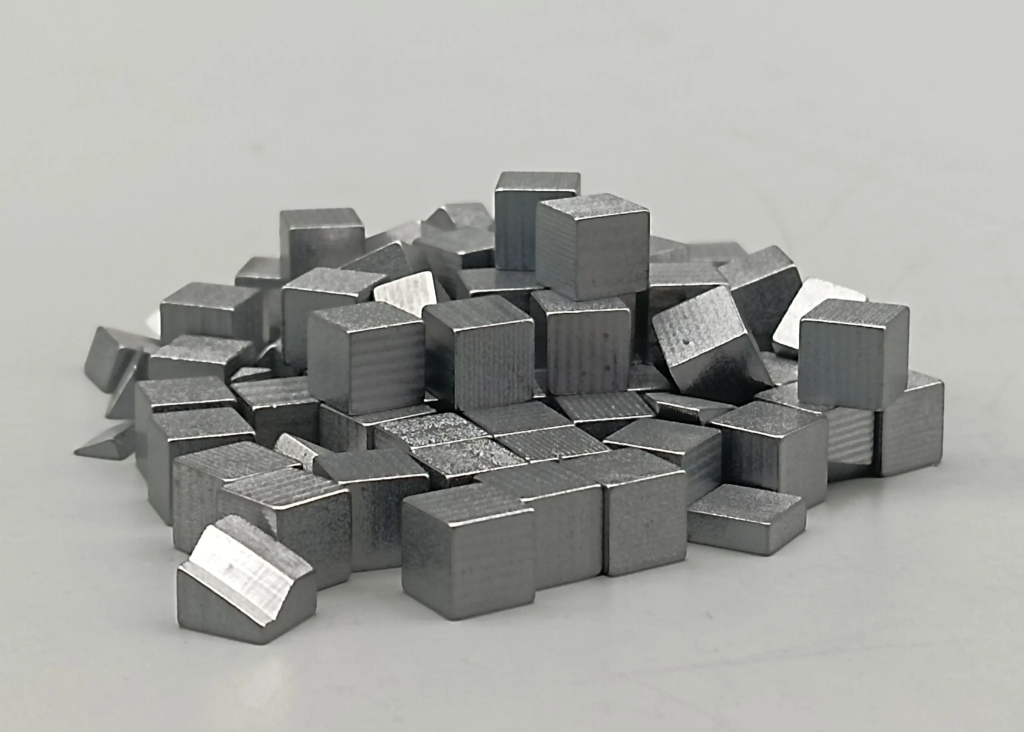Vanadium Pellets Vanadium Granules
Vanadium pellets and granules are different shapes of vanadium metal, offered in compact cylindrical (pellets) or irregular (granules) shapes. Due to their excellent magnetic properties, corrosion resistance, and high melting point, they are widely used for evaporation materials, thin-film deposition, and advanced alloy production.
Vanadium products including Vanadium Powder (Spherical and Irregular nanopowder), Vanadium Carbide Powder, Vanadium Nitride Powder (Nano powder and Micron powder), and Vanadium Foil Vanadium strip are for sale at a competitive price.
Formula | Vanadium, V |
CAS Number | 7440-62-2 |
Purity | 99.7% min |
Shape | Pellet, granule, and ball |
Sizes | < 10 mm |
Color | Silver, Metallic |
Melting Point | 1910 °C |
Thermal Evaporation Techniques | Boat: W, Mo |
Density | 6.11 g/cm3 |
Description of Vanadium Pellets Vanadium Granules
Vanadium, a transition metal, is valued for its high strength, corrosion resistance, and ability to form stable alloys. Vanadium pellets are compact, uniform cylindrical shapes of high-purity vanadium metal. These pellets are commonly used in alloy production, thin-film coating processes, and as a doping material in various industries, including aerospace, electronics, and energy storage.
Manufacturing method of Vanadium Pellets Vanadium Granules
Raw Material Selection High-purity vanadium is sourced to ensure consistent quality and performance.
Melting and Forming
- Vanadium is melted in a vacuum or inert atmosphere to prevent oxidation.
- The molten metal is cast into molds or extruded to form uniform cylindrical pellets.
Size Grading and Surface Treatment
- Pellets are precisely cut or formed to achieve specific dimensions, typically ranging from 3–10 mm in diameter.
- Surface cleaning removes any oxides or impurities.
Main properties of Vanadium Pellets Vanadium Granules
Resistant to oxidation and chemical degradation
High Strength
Stable Thermophysical Properties
Application of Vanadium Pellets Vanadium Granules
- Vanadium pellet is used in steel and titanium alloy production to improve strength, hardness, and corrosion resistance.
- Thin-Film Deposition: Serves as a source material in sputtering and vapor deposition for coatings in electronics and optics.
- Energy Storage: Used in vanadium redox flow batteries (VRFBs) for renewable energy storage.
- Catalysis: As a catalyst in chemical processes, such as sulfuric acid production.
Vanadium Pellets Vanadium Granules Scholar Articles
Abstract: In this study, a clean pellet production method of calcium roasting and sulfuric acid leaching of vanadium from vanadium and titanium magnetite concentrates is proposed, which can effectively separate vanadium and iron, and the pellets after acid leaching and vanadium extraction can be used as raw material for iron making after secondary roasting. During the experiment, only 2% Ca(OH)2 was added as the calcifier to make pellets, and vanadium was extracted by acid leaching after calcination. Under the optimum conditions, the vanadium leaching rate was 74.51%, and the iron leaching rate was only 1.05%. After secondary roasting, the compressive strength of the pellets was 2358 N, and the qualification rate was 97%. Additionally, after acid leaching and vanadium extraction, the impurities in the pellet were partially removed, and the iron content of the pellet increased by 6.6%, which is more conducive to subsequent ironmaking. The roasting and acid leaching experiments show that based on the production of iron smelting pellets, the use of pellets can better extract vanadium from the titanium magnetite concentrate, while avoiding the problems of excessive additives to reduce the iron grade of pellets. Or the pursuit of high vanadium extraction rate pellets, which can be seriously damaged and difficult to use later. This process can perform a comprehensive utilization of vanadium titanium magnetite, and has certain guiding significance for industrial production.

